Doug Jung, co-writer of Star Trek Beyond, brings up that Zero Dark Thirty thing again. Jung talked to Entertainment Weekly recently about the process of writing the movie, his onscreen role as Sulu’s husband, and his thoughts on where the franchise could go next.
When asked about the future of the Star Trek franchise, including the possibility of spin off series and films, Doug Jung expressed his excitement over a Star Trek universe that includes darker, more action-oriented movies and even tossed around the idea of a “Starfleet Academy” movie.
It’s a franchise that can support different styles of movies. There’s the big action tentpole feel of Star Trek and the Enterprise, but why not try to do something that’s the Zero Dark Thirty version of Star Trek, or one that introduces some younger characters at the Academy?
We’ve heard the Zero Dark Thirty idea before; last year, a Paramount exec told Wired Magazine that he had given some thought to the areas of the Star Trek universe that “haven’t been taken advantage of” proposing both “Star Trek: Zero Dark Thirty” and “the SEAL Team Six of the Star Trek universe”.
TrekMovie editor Kayla Iacovino expressed her disdain for the concept, along with an illustration for good measure. The problem with this kind of thinking, she argues, is that there are already 800 other movies full of espionage stories and tough-guy military stories, and they all run completely counter to the philosophy behind Star Trek and the very ingredients that make it so unique. Would adding familiar elements from commercial blockbusters revitalize Star Trek, or kill it?
That said, Jung has some pretty good ideas in there too. A Starfleet Academy story has obviously been floated around for years, from a series that never got made, to the Next Generation episode “The First Duty,” and would satisfy Hollywood’s youth obsession at the very least. The idea of honing in on smaller storylines has some merit, too, like taking a deeper dive into specific alien cultures, exploring places one of our crews have affected and left behind, or doing a Star Trek movie with an entirely new set of characters we haven’t seen before. The tricky part is to remember that it’s Star Trek, which means retaining the philosophy, the ideals (and yes, idealism) of that universe. It’s not perfection that’s needed, but an understanding that there are dozens of dystopian future movies out there and Star Trek is supposed to be different.
Jung also talked about the appeal of a Star Trek cinematic universe akin to the way the Marvel, DC, and Star Wars franchises operate today:
It’s 50 years’ worth of discovery, and obviously they’re doing that with Star Trek Discovery, but why not blow it out to a cinematic universe that has secondary characters, and smaller storylines, more intimate storylines, ones that deal with more of an espionage element versus the large-scale exploration themes of the main Star Trek.
There’s definitely some good thinking in there, especially in light of the yet-to-be-judged Rogue One. In 2014, Star Trek writer Mark A. Altman (The Fifty-Year Mission) gave us his in-depth thoughts on how to revitalize the franchise, which notably included the prophetic suggestion of giving a new series to someone like, say, Bryan Fuller. (Good call, Mark; we’re still sad about his departure.)
One thing Jung is definitely right about is that it’s a flexible franchise. Look at the difference between Deep Space Nine and Voyager; both are true to the Star Trek universe and yet they’re wildly different in tone as well as in the stories they chose to tell.
On Beyond‘s villain
Jung also talked about Beyond, explaining that Krall was “not the full actualization of where we want to progress to as a species” due to his inability to change with the times. They kept him accessible:
[Krall] becomes consumed with the darker impulses of who we are, but in a very understandable and relatable way.
On being Sulu’s husband

Jung also discussed his brief stint in front of the camera, saying:
I’ve always been incredibly proud of that scene, even when it was just on the page. I’m even more proud of it now…We wanted to depict [their relationship] as a normal part of the fabric of life. Which it is! I think it will stand the test of time. The great victory would be that, in however many years, if they look back on Beyond as part of a Star Trek retrospective, they wouldn’t even blink.
It wasn’t an attention-getting moment, but rather a way to just show that it doesn’t have to be such a thing; it just is. John Cho has admitted that there was a scene in the script that never got shot of Sulu kissing his partner, but Jung says he thinks the moment works just as well without it.
Read the full interview at EW.

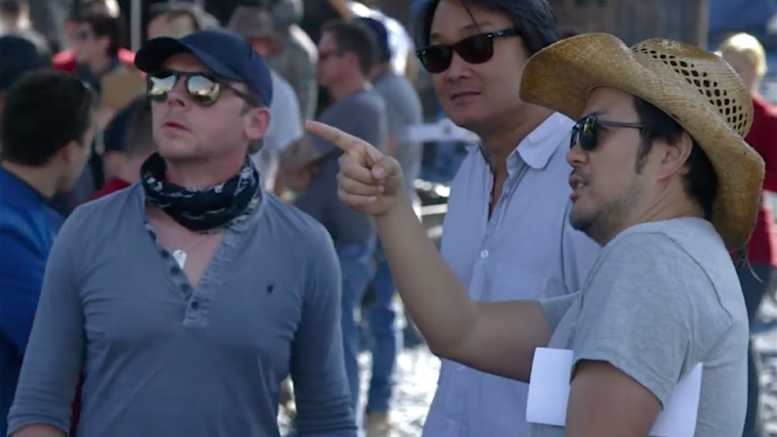
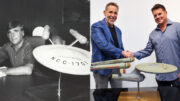
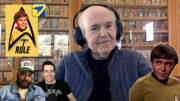
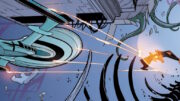
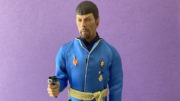
I think that the introduction of Section 31in STID is as close to Zero Dark Thirty that Star Trek will ever get. (I hope.)
Just what Trek doesn’t need, more mindless action, dark elements and gore. How about just telling a truly compelling story, rich in tone with great character moments and an ORIGINAL premise that really makes you think?
Nah, that makes too much sense!
Now, now, Harry. We could have that Zero Dark Trek. The crew could be called out to rescue some hostages… maybe on the Planet of Galactic Peace… and Zoe could do a fan dance to distract the baddies while Kirk punches a martinet kitty cat. Oh, and there should be campfire songs and Spock should make fart jokes.
CmdrR,
I think you’ve confused ZERO DARK TREK with BLAZING SEATTLES [ sic ]
“… action, dark elements and gore…” Hmmm, sounds like Star Trek II: The Wrath of Khan. It was a serious departure from the Trek that preceded it, and it singlehandedly saved the franchise. Ironically, Star Trek: Beyond is said to be most “trek-like”, but it was also the poorest performing JJverse film. If Trek is to survive in the future, it needs to give the audience what it wants. If the audience wants action, dark elements and gore, then Trek films need to deliver action, dark elements and gore.
Sometimes you give the audience what it wants by showing the audience what it wants. Trek must not play follow the bouncing box office, struggling to constantly reshape itself (like ODO on a weekend bender) into the form of the latest blockbuster. I really hope ST:Next does not turn into a gore fest of torture porn and tissue thin characters (covered in stubble). If the audience does go away, Trek will still not be dead. Nothing that’s made as much money as Trek has will be permanently forgotten. I hope.
Roberta Lincoln,
Re: singlehandedly saved the franchise
There was no “franchise” to save. That was just a creation of mindless Paramount bean counting drones that were trying to wrap their heads around the fact that this thing that they were vehemently trying to get Bludhorn to dump, had been magically generating enough revenue to keep the lights on and the rent paid. Hell, they even tried to sell it to Roddenberry for $150,000.
How the heck does something that was only worth $150,000 to them generate $175 million worldwide at the box office and need “saving”?
The only thing that needed saving were the cya Paramount execs and the franchise horse they rode in on.
@Roberta Lincoln
I never get when people claim that Star Trek has to attract audiences who do not like Star Trek to survive. Why? When did pop culture stop having a particular audience that enjoys a particular way of entertainment? Science Fiction is and will always be niche, and that is ok. If Trek can generate ‘only’ 300 million at the box office, so be it. The rest is shareholder growth thinking.
When there is too much money involved, investors and producers become scared, formulaic. I just hate to see another predictable hero’s journey on screen.
Zero dark trek or the Trek Identity could still address Trek ideas. There was actually a good political/moral conspiracy thriller buried in Into Darkness.
Agreed.
It would be nice just to see Kirk and his crew visit a strange new world and seek out a new civilisation in a film, then fly off in their starship to another world for the next film. Thus far, everything ties back to threats to Earth or angry mutated humans destroying things.
I wish the people working on the films would actually watch the original sixties TV show and see how the Enterpise’s involvement with planet Earth was pretty limited outside of accidents and time travel. As a child watching TOS, when it was plain old Star Trek and there were no spin-off shows, I basically felt the series showed that humans had moved beyond Earth and it was now simply an ancestral home, with colonies having obviously existed for centuries. Why would someone who grew up on a planet circling Alpha Centuri, whose Dad had been born on a planet circling Betelgeuse, whose Mum had been born somewhere near the Horsehead Nebula, give much thought to Earth beyond it being worth popping over there for a holiday once in a lifetime?
The Trek movies’ obsession with having to tie everything to Earth is the equivalent of having to start every American film with the main character visiting Europe because his family originally came from there. It’s very limiting.
Incredibly well stated! Do you have the time to pickup where Fuller left off and earn that paycheck? This is what we need to a T.
BTW: That was to Dom. . .
I would like to know why all these Producers, Directors talk Zero Dark Thirty, etc but when it comes to actual starship combat the scene ends up lasting like 20 seconds until the warp core explodes (exception – Star Trek Beyond where the Enterprise has no chance to fight back effectively not even using proximity torps) or suddenly there are thousands of starships that just rush each other like it’s Braveheart in space. I don’t get why the first writers of Trek were able to nail Balance of Terror and the Doomsday Machine in the 60s with the fate of the quadrant resting on what happens with one or two starships and set up the promise of a D7 vs. Connie for the fate of the universe while writers today cannot?
Yup. The lack of originality reminds me of Roger Ebert’s famous criticism:
“The starship can go boldly where no one has gone before, but the screenwriters can only do vice versa.”
Maybe It was the reputation of “The U.S.S. Enterprise”(CV-6) itself that colored their imaginations (look it up in wikipedia). These guys were writing in the early sixties and were likely WWII veterans themselves, and very familiar with the famous reputation of CV-6. There was an excellent “Battle 360” 10-episode series that was done on the Enterprise CV-6 (I never realized HOW famous the Enterprise was until I saw this). At the beginning of WWII, there were only 5 or 6 Aircraft Carriers in the pacific fleet (and Pearl Harbor PROVED that Carriers were the primary capital ship now). In the early naval battles, our Carriers were getting picked off, one-by-one, until there was only the Enterprise left (THAT episode was called “Enterprise vs the Japanese Empire”) to fight against the Japanese Carriers. We sunk several of theirs too, but they had more than us at the time since they were already into WWII in the early thirties. This was before all of our Essex-Class Carriers came on-line. During the Battle for Guadalcanal, the Enterprise couldn’t even land their planes onto her deck, due to battle damages, and could only launch them to join the Army planes on Guadalcanal Island. It took so long to capture that island because we were so short of supplies and ships and only the one Carrier which couldn’t land planes. By the time of Iwo Jima we had a huge fleet and dozens of new Carriers big and small. THIS probably provided the background for the war-like episodes. The Dominion War could have been made like “WWII in the Pacific” with its’ hundreds of battles big & small, skirmishes, covert ops, etc…in fact, we could still go there, to “flesh out” what happened in the Dominion War. This should provide all the necessary “war, gloom, dark, etc…” the Franchise needs. We could even revisit it, from time-to-time as haunted memories of veterans still in StarFleet Service (my father-in-law was a navy veteran of WWII, Korean War, and Vietnam War, served on everything from Carriers to “brown water” river craft. Retired as a Master Chief Petty Officer. He passed away a couple years ago. I still miss him).
Zero Dark Thirty? ummmmm…..no. Vets everywhere laugh at that movie. How about more like a Fury movie set during the dominion or romulan wars.
Snugglepuffxlz,
What would the average military grunt know of the reality or unreality of a top secret elite SEAL unit?
Although, I remember my Army Vet father constantly complaining about how the KW history was rewritten so that the Marines were the first in, last out or only ones there…
The fact that you have to say “average military grunt” tells me you understand nothing.
Answered your own question. Folks on-point/on-site in the moment are probably the only ones who know ‘true’ history, and they’re usually bound by oaths against talking about it. Also you have the ‘domino principle’ of assassination as noted by Kirk in TUC, so the key players in such ops need to ‘get secured’ in wet type actions … or are so entrenched in it that their silence is guaranteed due to their own involvement.
For my money, the concept is not bad, but it’s in execution and while I have liked all three reboot movies (yes even STID, for all it’s flaws), and Beyond was my favourite of the bunch, so far I don’t quite see the ability in Paramount’s executive staff to handle something like this. In order for there to be a coherent universe there needs to be a “Universe Runner” like a showrunner but for all movies and shows. For Marvel that’s Kevin Feige, until recently for DC that was Zack Snyder, now it’s Geoff Johns and we may see some improvements thanks to that. For DC’s TV (Arrow, Flash, Supergirl, Legends) it’s Greg Berlanti. Usually someone with a singular vision to do this kind of stuff is what a coherent universe needs.
I don’t think the idea of a darker Star Trek series is bad, and I think this is where people often get things a little confused. It’s not about the setting, it’s about how those characters act in that setting and how they can overcome darkness that exists. The best parts of Trek weren’t when things were happy and fun but when humanity, though it had evolved had to struggle with itself. Examples: ST: First Contact, DS9: Paradise Lost, DS9: In the Pale Moonlight, ENT: Terra Prime e.t.c. The contrast of conflict versus unity is what made Star Trek Beyond fantastic in my mind and really showed off what Trek was all about, perhaps more relevant than we’ve ever seen it today.
One of the things that the Kelvin timeline and even the later Next Generation movies of the Star Trek universe has seemed to abandoned is the magical or mystical aspect that happened in the Original Series.
No more alien beings like Adonis, Excalbian, Melkotian, or General Trelane, though Q was the closest to the latter, and the likes of him later disappeared like he never existed. There is a way of exploring that ‘weird’ side of Star Trek without being cheesy, but I guess they have to play to the lowest common denominator, which is phasers and fisticuffs.
I agree. Trek seems to have lost it’s way in that respect. It’s lost the creative imagination of what lies in the unknown…one very important component of what made the original TV series so endearing and unique. The latter spin-offs were afraid to go there or just didn’t have the creative chops to make it happen. But I still love Kirk’s fist-fights, sorry! Tempered with the right balance of suspense, humor, romance and imagination,…fist-fights are just another part of a very successful formula. Star Trek, notably the original series, was always escapism at it’s finest…we need to get away from the “human condition” prattle that Roddenberry preached in his later “enlightened” years, stop trying to be the roadmap to utopia and get back to the dangers and perils of exploring the unknown. How REAL human beings are affected by those fantastic and imaginative adventures is where we explore humanity. But first and foremost, it is escapist entertainment…not a religion. I want to be entertained, not preached to. I want to have fun, not become restless with boredom. I want to look forward to watching an episode or movie again, because it was so entertaining and I like the characters…not forget about it.
I’m not sure we’ll ever see the likes of TOS again…I’m not sure the proper mindset exists with fans who were saturated with 20 years of bland Bermanized Trek or with the current creative forces, whose ability to take Trek back to it’s strengths seem to always be severly limited by the forced parameters set by the latest block-buster. The new movies are definitely a step in the right direction, but you can only do so much in 2 hours. Sadly, I’m afraid the new TV series may already be hurting from a percieved need to be clever, life-changing and revolutionary. Please don’t get pretentious, Star Trek. Just entertain me and do it in a unique, creative fashion. If you give me another serialized drama, like every other show on right now, and you look like every other show right now, why should I bother? Embrace the weird and unknown, Star Trek: Discovery, it is your friend…just ask the original series.
I liked this post, Beyoundthe Tech.
Star Trek is missing its myth-enducing charm.
Where is the like button!?
Most TOS episodes came with a side order of cheese, and in my opinion, they were all the more fun for it. YMMV. :-)
Still can’t figure out why it’s called Star Trek Beyond. Other than a cool title, how did it relate to the movie? I legitimately need this explained to me. When I heard “beyond” I was expected a really heady outerspace drama like Interstellar. Instead I saw angry alien rubber suit guy.
To be honest, I thought “Into Darkness” was stretching it too. They didn’t really take a journey into darkness thematically. They just stopped some torpedoes.
This is one of the few Star Treks where they actually go “beyond” where we’ve already been: they are literally past the frontier of known space.
korusan,
Re:This is one of the few Star Treks where they actually go “beyond” where we’ve already been
Aren’t you conveniently forgetting the lost VOYAGER and wormhole just outside DEEP SPACE NINE? Both series went past the frontiers of the Federation’s explored space. And even in the first series, it left the galaxy with the Kelvans, and the known universe once with Lazarus and the other via mirroring transporter, as well did TNG explore unknown space, in its own way.
One of my favorite Voyager episodes was “Year of Hell” which was dark and gritty with a massive threat. Of course they tied it up in a neat clean little bow at the end but my point is that I think it can be done within the confines of Trek. Now some of you might not like that episode because it was un-trek-like. I don’t know. It’s been awhile since I’ve seen it so I can’t say for sure right now. However, I do find it otherwise memorable.
That’s also one of my favorite Voyager episodes; to me it felt closer to what a lone starship stranded in a distant quadrant would really go through, as opposed to the squeaky clean endings the show usually had.
I would love to see a series based on similar stories as the Equinox on Voyager. That is one of the best episodes of all time IMO – the Equinox is what Voyager should have been, a ship falling apart, a crew desperate, resources dwindling….sort of like that TNG episode where Riker is in command of the Enterprise in a universe overrun by the borg. That one short clip gave me chills and had more substance than all three JJ movies combined. It would be fascinating to explore that kind of scenario for an entire series, like the Walking Dead of star trek, where you never know who’s gonna die, or what desperate measures the crew will take to survive. The whole peace throughout the universe crap is soo tiresome.
Remember ‘Tuvix’? They should have left Tuvok and Neelix dead and hired the actor who played ‘Tuvix’. He was as good as both of them combined and Tuvix was an interesting character. But…. got to hit that ‘reset’ button EVERY DAMN TIME.
Why do these interviews become editorials?
The world is already dark and gritty and filled with gore. I want my Trek to be enlightened and show a path to a better future, while still commenting on our world as it is today. You just have to write it, and quit using shortcuts like new timelines and making it dark. Making it like Zero Dark Thirty is just not Trek. If I want dark and gritty and filled with gore I have Game of Thrones. Star Trek should not aspire to be Game of Thrones. While “Beyond” was better than “Into Darkness”, the heart of Trek has always been the idea humans are better than this i.e. our current world.
Yes, yes, yes!
Yes, I agree, Phil.
There is more than enough grit in the world and who knows what there might be out among the stars. Perhaps a great deal more grit, violence, gore, suffering as well. On the other hand, there may be corners of our vast universe that knows little of such and where beings live amazing lives filled with wonder… Cannot writers imagine such worlds as well and bring those to us. Star Trek always seemed the perfect for this to happen.
I’m often disheartened that whenever this chat comes up, writers can’t seem to think outside the bubble of the USA. Why would it have to be the “SEAL team Six” of Star Trek? Why does all of Star Trek seem to just be a futuristic version of the current US military? If we truly espouse the IDIC principle, then let’s tell stories from more non-US sources. How many great armies/battles/last stands etc. have there been throughout history that weren’t US-led? I’m thinking the majority.
While we’re on the subject of diversity in military, there’s no better example than the Battle of Britain. We often think of the “few” as being English Oxbridge boys, but in truth they were outnumbered by Canadians, Australians, New Zealanders, and Polish refugees. They all fought under the Union Flag, but each kept their own cultural identity.
Being Canadian, I will admit my bias towards the Canadian Corps of WWI. There is a wealth of stories from the Western Front involving the Corps, from the first gas attack in 1915, to the pyrrhic victory at Passchendaele in 1917. Throughout, we have a war involving new and terrifying technology and weapons, which most thinkers are certain will end the universe. At the centre is a Corps of the unlikeliest men (and women) who are hardened into the point of the Allied lance and never give up hope that peace can be won. If this isn’t fodder for great Star Trek stories(see the Dominion War of DS9), I don’t know what is.
Why not leave the expanded universe to fan productions, with some content control? CBS should be offering to put their stamp of approval on these productions, which would keep them sort of inline with a relatively structured universe. Then they should be playing/distributing the content as tv series/tv movies/webisodes, which makes them money, includes and improves fan productions/involvement and expands the Star Trek universe. Wherever a particular area of that universe seems to become really popular, Paramount or CBS can jump on it and do the big budget treatment…
Will never happen, I know…
OK then, let’s do this!!!
Can they just do a true science fiction story? Something that’ll actually make people look away from their iPhones for five seconds and think? That is what good science fiction should do. I liked “Beyond”, it was a lot of fun, but turning “Star Trek” into something it was never meant to be is aggravating.
I still believe that a “Star Trek” movie can be made that really pushes the envelope in the realm of science fiction instead of being a derivativation of other films and concepts.
@CofC:
I guess that’s no longer the focus of ST’s producers OR audience. That’s why we have things like ARRIVAL…
Star Trek Beyond was/is Star Trek – at its core!
@ Keachick:
Hard to tell who you’re replying to, but I happened to enjoy STB a LOT, especially after the woefully morose and dreadful STID. But with all the ongoing franchise emphasis on darkness and revenge-driven adversaries, action, and space battles, it sure as hell doesn’t feel like the Star Trek I was drawn to start watching in the fall of 1966…
Isn’t the first half of the 2009 film already the realization of the old Starfleet Academy idea?
A really awful realization, maybe. The Bennett/Loughery version in outline form read kind of hokey, but was a ton better than the 09 mess.
Speak for yourself. ST09 was fine.
@kmart:
Got that right, re: ST09. A real mess, followed by the clusterf**k to end all clusterf**ks, aka ST(i)D. STB was mostly IMHO a breath of fresh air, but with our added (DVD) viewings, it’s still sprinkled with, er, clusters…
This election year has been so very nasty that personally, I need Star Trek’s optimism more than ever! I don’t WANT to see a corrupt Starfleet or a corrupt Federation; I want those organizations to be the Good Guys with capital “G’s,” to inspire us and to give us hope that it IS possible.
Sigh.
Statements like Jung’s, a cowriter of the movie, make me feel despair. He clearly has no idea what makes Star Trek special. It’s just another toy to play the same moronic movie game to him. It’s so disheartening that Gene’s vision is now in the hands of people who have no vision and no poetry in their soul. I hope we get a small budget, smaller audience Star Trek instead of a big budget bigger audience Star Trek that is Star Trek in name only. it didn’t survive 50 years by having nothing different to say.
I don’t see it that way at all. Could easily imagine Gene L. Coon writing and producing something that put Kirk in conflict with a ruthlessly efficient commando team, antagonism that would deepen the story and put across the so-called trek values while being entertaining as hell.
The idea of GR’s vision is a hand that fans overplay when they ain’t happy, cuz I don’t think GR’s vision ALONE would have sustained for any period of time without artistic (and practical-mind) oversight from Coon and Justman.
If Trek had gone ahead as GR planned early on, with Frieberger instead of Coon in season 1, none of us would be here right now — Coon is the guy who took the novelty of TREK and made it work artistically and in a way that sustained beyond the initial concept.
Very well said.
@GarySeven:
I too feel unease for the future of ST. I had high hopes exiting the theater after first seeing STB, but re-watching it a few times on DVD since, and reading things like: “Doug Jung expressed his excitement over a Star Trek universe that includes darker, more action-oriented movies” shot that down in flames, especially if that’s what today’s fans want. As you say, there’s “no vision and no poetry” in darker, action films. They need to get off that ever-descending escalator and watch (or read) some of Rod Serling’s better Twilight Zone episodes to reboot their approach toward something a hell of a lot more hopeful. The cinema realm is already bogged down by too many grim, violent action films to bear any more, especially from the hopeful, forward momentum of a “Wagon Train to the Stars.”
What the movies have never done is embrace the feeling of exploration that the original series had. I’m a fan of most of the TREK movies, but I’d like to see one that wasn’t so action oriented, a story where we begin seeing an away team beam down onto the surface of a planet just to see what’s there.
The only way a “Star Trek Cinematic Universe” could work is if the films are scaled down as standalone stories. meaning, each movie should have the budget equivalent to a typical ‘Trek episode.
@dswynne:
Agreed.
Hmmm, I kinda like the idea of a Starfleet Academy style movie possibly centering around Jaylah from Beyond. Starfleet is kinda still bruised up from ST 2009 and STID. Showing Starfleet’s hesitance and possibly some political backlash from a rogue Admiral & starship crash into San Fransico may bode for an interesting story.
I’m all in for the return of Star Trek Cinematic Universe. From various TV shows to stand-alone movies that show different aspects of that universe.
Give us a MACO story set during the Romulan War or a “special task force” type story. An Academy story would be a great way to bring in younger characters and follow them on their first assignment (assuming the Academy film series would be successful). People frown on the Zero Dark Thirty aspect but some of the best parts of Trek VI were the darker Tom Clancy-esque tropes that were used.
It’s important to note all the ways the “gay” scene was a regressive cop-out. It all sounds so evolved: We don’t emphasize it, just show it’s a part of normal life.
Except:
Sulu has been away on a big chunk of a 5-year mission and when he finally sees his husband he greets him like he might a cousin picking him up at the airport. But Jung has a child in his arms so they couldn’t really do more, right? Right. The child is no accident.
Nor is Jung being Asian too. That way he could in fact be a cousin picking Sulu up at the airport, one might argue to Chinese censors.
China does not allow depictions of homosexuality onscreen. Star Trek has been scrupulously shot to meet this criteria. As is their business. But Pegg and Jung taking credit for supposedly being brave when they are in fact coddling homophobes is sickening
Can’t wait for the new release! Great Post.